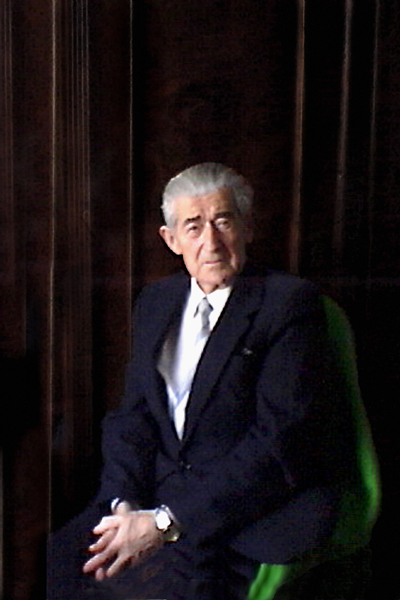Our beloved husband, father & father-in-law Listen to excerpts from an interview with Stanisław about the WWII & Auschwitz (MP3's in Polish only) conducted by his son Jacek in 1997 (on his 75th birthday) in Polish. (I hope to publish the full set as a book in Polish and English) Read about the "Heroism of Sonderkommando Auschwitz" (in Polish only) |
A man of human values. An Auschwitz survivor. Born four years after the 1st WW in Łódź, the city of four cultures (Polish, Jewish, German & Russian) was brought up in a family of a simple office worker and a highly educated mother (his mother had a high-school diploma (matura), a relatively high achievement in those times for a woman from a family of very modest means). He was one of four children (he had two late brothers and a late sister). Education was highly valued by his parents. Graduated just before the II WW with a "small high-school diploma" ("mala matura") from one of the best men's high schools (gimnazjum meskie) in Łódź (Trojka, III LO im. Pilsudskiego, now im. T.Kosciuszki). When the war broke out in 1939 he was 17. After German invasion of Poland in September 1939, his home town Łódź became officially a part of Germany, while Warsaw (located only 135km north-east from Łódź) was included in a newly created by Germans "Generalna Gubernia". Thanks to my father's aptitude for geometry and technical drawing, he was able to get a job as a "Dach decker" (roof repairman) in a German-owned shop. Later, this occupation saved his (and his brother's) life in Auschwitz. Never paid attention to material values. His motto was "one should not own anything, because it is so easy to lose...". First, he lost his father just after their family house was built (in the mid-1930s). Then in 1939 German-Nazis invaded Poland. His mother died in 1941, and he lived together with an older sister and a younger brother (the eldest brother was drafter to the army in Sept 1939 and captured by Germans; he spent war in a German camp for officers). Because the two brothers were listening to and spreading information from the allied nations' radio stations and because Germans wanted to take over their family house, the three siblings ended up in Auschwitz (Auschwitz-Birkenau). He and his brother were subsequently moved to concentration camp in Gross-Rosen and then to Flossenburg-Herrsbruck. Toward the end of the war they were being transported to KL Dachau (concentration camp in Dachau near Munich), but managed to escape. His and his younger brother's liberation came from Americans in a small German village Appercha (near Munich). After spending some time in American camps for displaced persons, he decided to return to his native country. An American Army uniform was his only outfit for many years. Then came Soviets. They took away and destroyed what Poles still had after the war. He graduated from the Technical University of Łódź shortly after the war with a Masters degree in Electrical Engineering (mgr. inz.). While working for "Elektromontaz" he was involved in a few large national heavy industry and infrastructure projects in the '50s (in Skawina, Nowa Huta, Konin). He later specialized in designing high-voltage transformers and their production lines and worked for many year for "Melta", where he was a CEO for a couple of years (around 1960), and "Elta", where he was a Chief Export Engineer (in the '60s) and later managed a design unit ("Elta" was bought by ABB in the '90s). Stayed true to his values. Never succumbed to SB (the "Polish KGB") and, in spite of numerous "persuasive" efforts, managed not to join the communist party. He believed he was left alone thanks to being an Auschwitz survivor. He was only made to take a post-graduate training in Marxism-Leninism (at WUML). He retired earlier (at 61) when he was asked to fire 50 co-workers and dissolve the design unit he managed. Instead, he "fired" himself. A few years after taking the retirement he started working part-time in an institute for scientific information for energy industry. He was writing abstracts from scientific literature published in German and Polish. He worked there for a few years until the institute fired all part-timers as a cost-saving measure. The tragic experiences he went through during the WW II made his attitude toward Germans somewhat complicated. He accepted a friendly hand extended by a few German organizations (West German) and in 1984 visited West Germany for the first time. A small group of Nazi concentration camp survivors from Poland was invited by German families and priests. He made a lot of friends over there. Subsequently, he visited Germany on several more occasions. The friendships lasted. His friends became our family friends and visited us in Poland. In 1988, thanks to his friends in West Germany, I was able to "escape" the communist Poland. Two years later, on May 29, 1990, almost exactly 20 years before my father's death, he saw me to a plane departing Frankfurt am Main for Toronto. The tragic war experiences made him very religious. He kept his faith to the very end of his journey on the Earth. ( Jacek Gwizdka, son ) |
